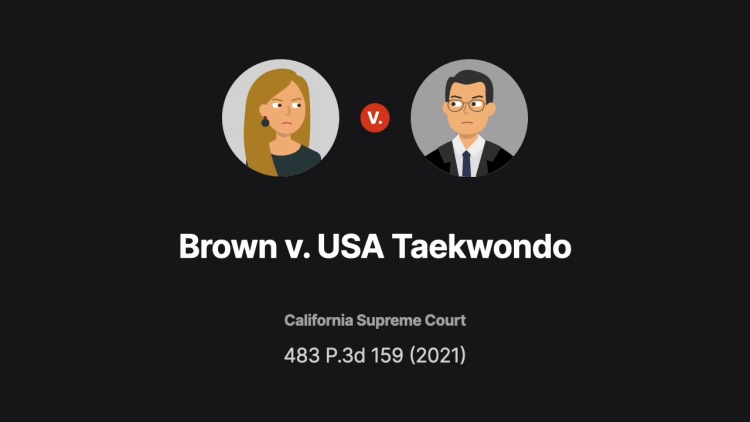Brown v. USA Taekwondo
California Supreme Court
483 P.3d 159 (2021)
- Written by Jamie Milne, JD
Facts
The United States Olympic Committee (USOC) (defendant) oversaw the national governing bodies for each sport in the United States, including USA Taekwondo (USAT) (defendant). To participate in USAT competitions, competitors were required to be members of USAT and train under a USAT coach. Yazmin Brown and multiple other teenagers (the athletes) (plaintiffs) trained under USAT coach Marc Gitelman (defendant). Gitelman sexually abused the athletes and was eventually convicted for his conduct. Seeking financial compensation, the athletes filed a tort suit against Gitelman, USAT, and USOC. Against USAT and USOC, the athletes alleged negligence, claiming that the organizations breached their duty to protect athletes from Gitelman’s abuse. USAT and USOC both moved to dismiss, arguing that they did not have a duty to protect the athletes from harm by third parties, such as Gitelman. The trial court agreed and dismissed the claims. The court of appeals reversed in part, finding that a special relationship existed between Gitelman and USAT, creating a duty to protect athletes from his conduct. In contrast, it found that there was no special relationship between USOC and Gitelman or the athletes and, consequently, that the dismissal of the claim against USOC was appropriate. The California Supreme Court granted review.
Rule of Law
Issue
Holding and Reasoning (Kruger, J.)
Concurrence (Cuéllar, J.)
What to do next…
Here's why 907,000 law students have relied on our case briefs:
- Written by law professors and practitioners, not other law students. 47,100 briefs, keyed to 996 casebooks. Top-notch customer support.
- The right amount of information, includes the facts, issues, rule of law, holding and reasoning, and any concurrences and dissents.
- Access in your classes, works on your mobile and tablet. Massive library of related video lessons and high quality multiple-choice questions.
- Easy to use, uniform format for every case brief. Written in plain English, not in legalese. Our briefs summarize and simplify; they don’t just repeat the court’s language.






